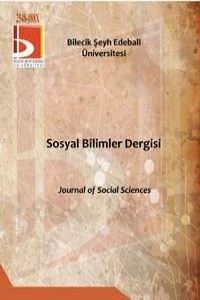Abdulrazak Gurnah’ın Kumdan Yürek Adlı Romanında Yersizyurtsuzluk, Kendine Yabancılaşma ve Toplumsal Yozlaşma
2021 Nobel Edebiyat Ödülü’ne layık görülen Gurnah’ın Kumdan Yürek adlı romanı, sömürgeciliğin toplum bireyleri üzerindeki yansımalarını betimleyen bir “oluşum romanı” olarak kabul edilebilir. Roman, sömürgeci güçlerin ülkenin bireyleri üzerinde bıraktığı etkiler nedeniyle, hem psikolojik hem de coğrafi olarak kendine ve memleketine yabancılaşan büyüme evresindeki bir çocuğun hikâyesini anlatıyor. 1890'da Zanzibar'da başlayan sömürge döneminin bazı ayrıntılarına da değinen roman, esas olarak 1963'teki Zanzibar Devrimi'nden sonra bir ailenin yaşadığı dağılmaya odaklanır. Gurnah, bu roman aracılığıyla sömürgeciliğin bitmediği, kültürel sömürü denilen başka bir biçimde devam ettiği mesajını verir. Bu bağlamdan yola çıkan bu makale, sömürge döneminden sonra ortaya çıkan ve bir zamanlar sömürgeleştirilmiş toplumların bireylerinin iç dünyasında umutsuzluk ve yabancılaşma duygularını zerk eden toplumsal yozlaşmanın altını çizerek, roman kahramanı Salim'in yaşamını ve kendine yabancılaşma sürecini ortaya koymayı amaçlamaktadır.
Anahtar Kelimeler:
özden yabancılaşma, toplumsal yozlaşma, yersiz-yurtsuzluk, kumdan yürek, sömürgecilik
Unhomeliness, Self-Estrangement, and Labefaction in Abdulrazak Gurnah’s Gravel Hearth
Awarded with the Nobel Prize in Literature 2021, Gurnah’s Gravel Heart can be considered as a bildungsroman, which delineates the repercussions of colonialism on the individuals of once colonized societies. It tells the story of a growing young boy who both psychologically and geographically becomes estranged from his self and his hometown due to the impacts and outcomes that the colonial powers have left on the individuals of the country. Through narrating some details of the colonial era, having started in Zanzibar in the 1890, the novel mainly focuses on the consequences that a family experience after the Zanzibar Revolution in 1963. Through this novel, Gurnah gives a message that colonization has not ended but continues in another form called cultural colonization. In this respect, underlining the societal labefaction that emerged after the colonial period and instilled the feelings of hopelessness and estrangements in the psyches of the individuals of once colonized societies, this article tries to reveal the impacts of colonization on the self through highlighting the protagonist Salim’s experiences and self-estrangement.
Keywords:
self-estrangament, labefaction, unhomeliness, gravel heart, colonialism,
___
- Ashcroft, B., Griffiths, G. & Tiffin H. (2001). Key Concepts in Post-Colonial Studies, New York: Taylor and Francis e-library.
- Bekler, E. (2014). The true face of pre-colonial Africa in Things Fall Apart. Respectus Philologicus, 25(30), 96-104.
- Bonnici, T. (2004). The contemporary post-colonial novel in English. Acta Scientiarum. Human and Social Sciences, 26(1), 1-22.
- Datta, S. M. (2019). Swahili Transmodernity and the Indian Ocean: Abdulrazak Gurnah’s Ethic of Community in By the Sea, Desertion, and Gravel Heart. Postcolonial Text, 14(3 & 4).
- Farahbakhsh, A., & Ranjbar, R. (2016). Bhabha‘s notion of unhomeliness in JM Coetzee‘s Foe: A postcolonial reading. International Journal on Studies in English Language and Literature, 4(7), 112.
- Gurnah, A. (2017). Gravel Heart. London: Bloomsbury Publishing.
- Nasta, S. (2004). Interview with Abdulrazak Gurnah. https://www.researchgate.net/ publication/45063291_Interview_with_Abdulrazak_Gurnah/citations. [Accessed: 10/07/2022].
- Schacht, R. (1970) Alienation. London: Allen & Unwin Publishing.
- Seeman, M. (1959). On The Meaning of Alienation. American Sociological Review, 24(6), 783-791. Published by: American Sociological Association. Stable URL: http://www.jstor.org/stable/2088565 [Accessed: 16/08/2022].
- Soleymanzadeh, l. (2021). Hospitality, Multiculturalism and Narrative Agency in Abdulrazak Gurnah’s By The Sea, The Last Gift And Gravel Heart [Ph.D. - Doctoral Program]. Middle East Technical University.
- Taş, M. R. (2011) Alienation, Naipaul and Mr. Biswas. International Journal of Humanities and Social Science. 1(11).
- Williamson, I. & Cullingford, C. (1997). The Uses and Misuses of ‘Alienation’ in the Social Sciences and Education. Blackwell Publishing, British Journal of Educational Studies 45(3), 263-275.
- ISSN: 2548-088X
- Yayın Aralığı: Yılda 2 Sayı
- Başlangıç: 2016
- Yayıncı: Bilecik Şeyh Edebali Üniversitesi
Sayıdaki Diğer Makaleler
COVİD-19 Sürecinin Bazı Makroekonomik Değişkenlerin Oynaklıkları Üzerindeki Etkisi: Türkiye Örneği
2000-2021 Dönemi Türkiye’de Sağlık Harcamalarının İncelenmesi ve Değerlendirilmesi
Bazı Yönleriyle Tasavvufî Düşüncede Şeyh-Mürid İlişkisi
Teknolojik Liderlik Davranışı, Kriz Yönetimi ve Uzaktan Eğitim Arasındaki İlişki: Öğretmen Algıları
